时态练习-四大时态练习
小学阶段四大基础时态练习题——一般现在时、一般过去时、一般将来时、现在进行时练习题

小学阶段四大基础时态练习题1.I ______ (write) a letter every day.2.They ______ (come) to see me next Sunday.3.We ______ (have) a class now.4.What ______ you ______ (do) now?5.He usually ______ (go) to school by bike.6.We ______ (not watch) TV on weekdays.7.They ______ (not take) a photo in the park yesterday.8.I ______ (not play) football very well.9.Do you enjoy ______ (listen) to music?10.He ______ (not watch) TV on Saturday nights.11.I am ______ (write) a letter now.12.They are ______ (come) to see me now.13.We are ______ (have) a class at the moment.14.What are you ______ (do) now?15.He is usually ______ (go) to school by bike.16.We are ______ (not watch) TV at the moment.17.They are ______ (not take) a photo in the park now.18.I am ______ (not play) football currently.19.Are you enjoying ______ (listen) to music?20.He is ______ (not watch) TV on Saturday nights.21.He ______ (write) a letter yesterday evening.22.They ______ (come) to see me last Sunday.23.We ______ (have) a class just now.24.What did you ______ (do) just now?25.He usually ______ (go) to school by bike yesterday.26.We ______ (not watch) TV yesterday evening.27.They ______ (not take) a photo in the park the day before yesterday.28.I ______ (not play) football yesterday.29.Did you enjoy ______ (listen) to music?30.He ______ (not watch) TV on Saturday night last week.31.I ______ (write) a letter tomorrow evening.32.They ______ (come) to see me next Sunday afternoon.33.We ______ (have) a class in an hour.34.What will you ______ (do) in an hour?35.He usually ______ (go) to school by bike tomorrow morning.36.We ______ (not watch) TV tomorrow night.37.They ______ (not take) a photo in the park next Friday afternoon.38.I ______ (not play) football tomorrow morning.39.Will you enjoy ______ (listen) to music?40.He ______ (not watch) TV on Saturday night next week.41.She ______ (be) a dancer.42.They ______ (be) in the park now.43.I ______ (write) a letter.44.What ______ you (do) now?45.We ______ (watch) TV now.46.He ______ (read) a book now.47.They ______ (play) football now.48.She ______ (dance) now.49.We ______ (study) hard.50.They ______ (swim) in the river.51.She ______ (jump) like a rabbit.52.They ______ (run) to the bus stop.53.We ______ (listen) to the teacher carefully.54.They ______ (not play) in the street.55.She ______ (not sing) in the next room.56.They ______ (not watch) TV at home now.57.I ______ (not study) in the classroom now.58.My friends and I ______ (play) in the playground now.59.Their parents ______ (work) in the office now.60.My teachers ______ (not teach) in this school now.61.He ______ (live) in the city, but he ______ (move) to the countryside last year.62.We ______ (not watch) TV now. We ______ (do) our homework.63.They ______ (jump) into the river every summer.64.Look! The birds ______ (fly) in the sky.65.They ______ (visit) the Great Wall tomorrow.66.What ______ you ______ (do) now?67.My parents ______ (not watch) TV on weekdays.68.I ______ (do) my homework now.69.He ______ (draw) a picture now.70.We ______ (not play) in the street now.71.What time ______ you ______ (get) up every morning?72.My grandpa ______ (grow) vegetables in the garden last year.73.They ______ (not play) basketball now. They ______ (read) books.74.I ______ (go) to school every day last year.75.She ______ (swim) in the river yesterday afternoon.76.They ______ (not play) with fireworks yesterday evening.77.I ______ (not watch) TV on school nights.78.He ______ (not play) soccer on the weekend.79.We ______ (not eat) in the cafeteria today.80.They ______ (not climb) the mountain yesterday.81.She ______ (not ride) a horse this morning.82.We ______ (not visit) the zoo tomorrow.83.My friends and I ______ (not go) to the amusement park last weekend.84.They ______ (not take) photos in the park this weekend.85.I ______ (not draw) a picture during class today.86.She ______ (not write) a letter to her friend last night.87.We ______ (not have) class tomorrow.88.He ______ (not play) the guitar yesterday evening.89.They ______ (not play) badminton in the gym yesterday afternoon.90.We ______ (not eat) pizza for dinner tonight.91.She ______ (not ride) a bike to school yesterday.92.My friends and I ______ (not go) to the movies last weekend.93.They ______ (not take) a walk in the park this weekend.94.I ______ (not draw) a house during class today.95.She ______ (not write) an email to her friend last night.96.We ______ (not have) class tomorrow.97.He ______ (not play) the guitar yesterday evening.98.They ______ (not play) badminton in the gym yesterday afternoon99.They ___________ (live) in London.100.We ___________ (go) to school every day.101.She ___________ (do) her homework now.102.They ___________ (play) football yesterday.103.She ___________ (not watch) TV now.104.We ___________ (not go) to the park tomorrow.105.He ___________ (swim) in the river last weekend.106.She ___________ (not climb) the mountain yesterday.107.They ___________ (visit) their grandparents next Sunday.108.My parents ___________ (not watch) TV now.109.She ___________ (write) a letter to her friend last night. 110.We ___________ (not go) to the zoo yesterday.111.They ___________ (not play) football now.112.My friends ___________ (have) a party next week.113.He ___________ (not climb) the tree yesterday.114.We ___________ (watch) TV now.115.They ___________ (not play) in the park yesterday.116.She ___________ (swim) in the pool last weekend.117.We ___________ (not climb) the mountain yesterday. 118.They ___________ (visit) their grandparents next month. 119.My friends ___________ (have) a picnic next weekend. 120.He ___________ (swim) in the river yesterday.121.We ___________ (go) to the cinema last night.122.They ___________ (not climb) the tree now.123.My parents ___________ (watch) TV last night.124.They ___________ (play) in the park tomorrow.125.She ___________ (not have) breakfast now.126.We ___________ (visit) the museum next week.127.They ___________ (not climb) the mountain last weekend. 128.My friends ___________ (have) a party next month. 129.He ___________ (swim) in the pool yesterday.130.We ___________ (not climb) the tree yesterday.131.They ___________ (not have) breakfast now.132.My parents ___________ (watch) TV tomorrow night.133.They ___________ (play) in the park next weekend.134.She ___________ (write) a letter to her friend tomorrow night. 135.We ___________ (go) to the cinema next month.136.They ___________ (not climb) the mountain tomorrow. 137.My friends ___________ (have) a party next weekend.138.He ___________ (swim) in the river last weekend。
英语四大时态练习题.doc

英语四大时态练习题1)经常性、习惯性的动作或存在的状态。
句子常带有表示频率的时间状语:always , everyday , often , once a week , never, sometimes , seldom , usually 等等She doesn' t often write to her family, only once a month.她不常给家里写信,仅一月一封而已。
I cycle to work every day。
我每天骑自行车上班。
2)表示主语的特征、性格、能力、爱好等。
e.g. He can swim. I work hard. I like watching TV.3)表示客观真理e. g. There are seven days in a week. The moon moves round the earth.. The sun rises in the east。
日出东方。
Ten minus two is eight o十减二等于八。
Light travels faster than sound。
光的速度比声音的速度快。
The United States lies by the west coast of the Pacific Ocean.美国位于太平洋西岸。
4)根据英文语法规定,当主句的谓语动词是一般将来时,那么时间或条件状语从句的谓语动词只能用一般现在时来表示将来要发生的动作。
主句表将来,从句要用一般现在时。
例:I' 11 tell him the news when he comes back. 他回来时,我将告诉他这个消息。
If you take the job , they will talk with you in greater details。
如果你接受这份工作,他们将和你谈谈细节。
用于一般现在时的副词,除了上面提到的一些表示频率的以外,常见的还有:now, today , nowadays等等。
(完整版)小学英语四种时态练习题丁晓彤
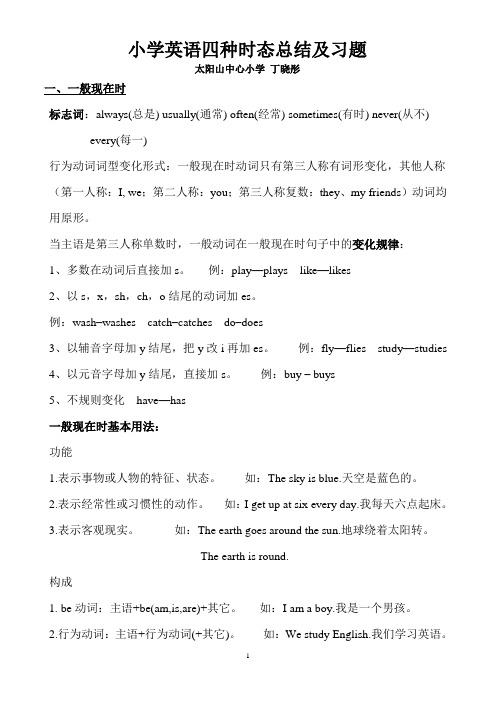
小学英语四种时态总结及习题太阳山中心小学丁晓彤一、一般现在时标志词:always(总是) usually(通常) often(经常) sometimes(有时) never(从不) every(每一)行为动词词型变化形式:一般现在时动词只有第三人称有词形变化,其他人称(第一人称:I, we;第二人称:you;第三人称复数:they、my friends)动词均用原形。
当主语是第三人称单数时,一般动词在一般现在时句子中的变化规律:1、多数在动词后直接加s。
例:play—plays like—likes2、以s,x,sh,ch,o结尾的动词加es。
例:wash–washes catch–catches do–does3、以辅音字母加y结尾,把y改i再加es。
例:fly—flies study—studies4、以元音字母加y结尾,直接加s。
例:buy – buys5、不规则变化have—has一般现在时基本用法:功能1.表示事物或人物的特征、状态。
如:The sky is blue.天空是蓝色的。
2.表示经常性或习惯性的动作。
如:I get up at six every day.我每天六点起床。
3.表示客观现实。
如:The earth goes around the sun.地球绕着太阳转。
The earth is round.构成1. be动词:主语+be(am,is,are)+其它。
如:I am a boy.我是一个男孩。
2.行为动词:主语+行为动词(+其它)。
如:We study English.我们学习英语。
句型肯定句:A. be动词:主语+ be + 其它成分如:He is a worker.B.行为动词:主语+动词(注意人称变化) +其它成分如:We like the little cat.否定句:A. be动词:主语+ be + not +其它成分如:They are not students.B.行为动词:主语+助动词(do/does) + not +动词原形+其它成分如:We don’t like the little cat.一般疑问句:A. be动词:Am / Is /Are +主语+ 其它成分如:Are you a teacher? Yes, I am. / No, I am not.Are they students of your school?Yes they are / No they aren’t.B.行为动词:助动词(Do/Does)+主语+动词原形+ 其它成分如:Do you like it? Yes, I do. / No. I don’t .Does he(she) like it? Yes, he( she )does. / No, he ( s he )doesn’t.特殊疑问句:疑问词+ 一般疑问句A. be动词:How many students are there in your school?B.行为动词:What do you usually do on Sunday?一般现在时动词be和have的变化形式1.动词Be 用法:第一人称单数用am,第三人称单数用is,其它人称用are。
四种时态练习及答案
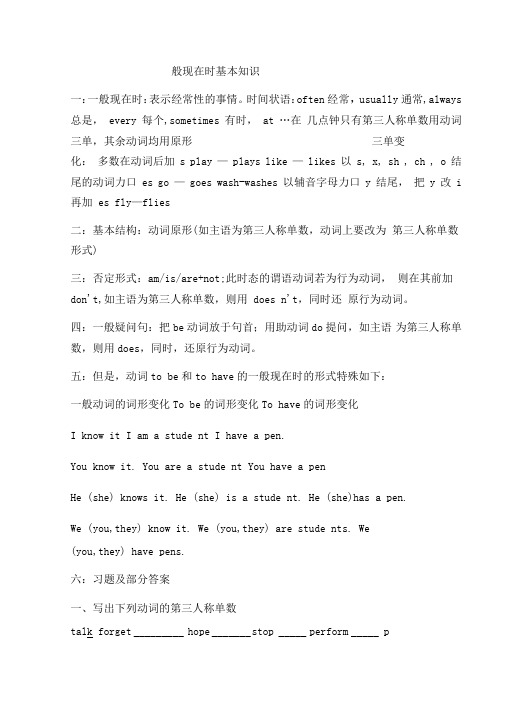
般现在时基本知识一:一般现在时:表示经常性的事情。
时间状语:often经常,usually 通常,always 总是, every 每个,sometimes 有时, at …在几点钟只有第三人称单数用动词三单,其余动词均用原形三单变化:多数在动词后加 s play — plays like — likes 以 s, x, sh , ch , o 结尾的动词力口 es go — goes wash-washes 以辅音字母力口 y 结尾,把 y 改 i 再加 es fly—flies二:基本结构:动词原形(如主语为第三人称单数,动词上要改为第三人称单数形式)三:否定形式:am/is/are+not;此时态的谓语动词若为行为动词,则在其前加don't,如主语为第三人称单数,则用 does n't,同时还原行为动词。
四:一般疑问句:把be动词放于句首;用助动词do提问,如主语为第三人称单数,则用does,同时,还原行为动词。
五:但是,动词to be和to have的一般现在时的形式特殊如下:一般动词的词形变化To be的词形变化To have的词形变化I know it I am a stude nt I have a pen.You know it. You are a stude nt You have a penHe (she) knows it. He (she) is a stude nt. He (she)has a pen.We (you,they) know it. We (you,they) are stude nts. We(you,they) have pens.六:习题及部分答案一、写出下列动词的第三人称单数talk forget _________ hope _______ s top _____ perform _____ play ______ s ay ______buy ______ w orry _____ fly _____ study _______ like ______ m ake _____take ______love ______ recite ______ become ________ come _______ drive ______shine _______leave ____ w ake ________ r ide ______ write ______ hike _____ give ___see ______ s wim ______ stop ______ s hop_______ plan ______ g et ______sit ______ l et ______cut _______ run ______ forget ______ begin ______ wash _____ watch_finish ____ teach ____ fish _______ r each _______ go ______ do _____ 二、用括号动词的适当形式填空。
小学英语四大时态总结及练习题
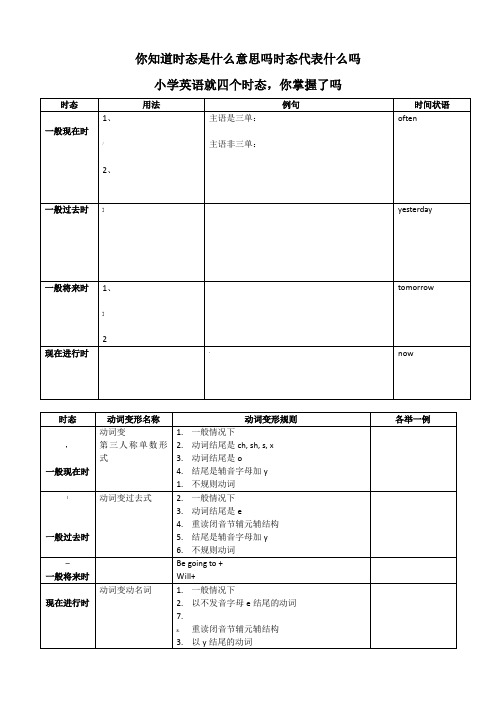
你知道时态是什么意思吗时态代表什么吗小学英语就四个时态,你掌握了吗你能发现它们之间的共同点和不同点吗勤加练习,百战不殆I.把下列动词变为第三人称单数形式。
1. clean--2. go--3. have--4.do-6. fly--7. come-- brush-9. watch-- 10. study-- 11. ask--(13. swim-- 14. catch-- 15. write--16. eat-- 17. make-- 18. paint—19. learn-- 20. phone-- 21. run—22. hop-- 23. sing-- 24. pick—II.把下列动词变成过去式is\am________ fly______ plant________are________ drink_________ play_______go________ make ______ does_________dance________ worry________ ask _____ taste_________ eat__________ draw________put ______ throw________kick_________ pass_______ do ________III.把下列动词变成动名词形式。
Wake________ make__________ come____________have____________!Take_________ leave__________ rid_________, regret__________, Begin________,cut________, get_________, hit_________, run_________, set_________, sit__________, spit__________, stop_________, swim________,beg_________, drop__________, fit_________, nod_________, dig___________, forget_________, travel_________visit_________Carry_________ enjoy___________ play ___________ study ________die_________ lie_________多加练习,百战不殆之时态篇一、用单词的正确形式填空:1.Mike _________ (do) his homework every day.2.There __________(be) some water in the glass.3.We like ________ (play) basketball after class.4.I like singing. I often _________(listen) to the music in the evening.5.【6.My grandma_________(watch) TV every day.二、判断句子的正误, 并改正。
四个时态练习题初二
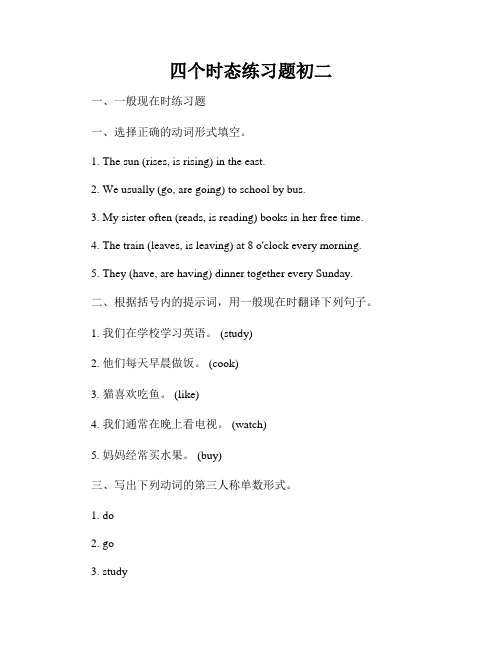
四个时态练习题初二一、一般现在时练习题一、选择正确的动词形式填空。
1. The sun (rises, is rising) in the east.2. We usually (go, are going) to school by bus.3. My sister often (reads, is reading) books in her free time.4. The train (leaves, is leaving) at 8 o'clock every morning.5. They (have, are having) dinner together every Sunday.二、根据括号内的提示词,用一般现在时翻译下列句子。
1. 我们在学校学习英语。
(study)2. 他们每天早晨做饭。
(cook)3. 猫喜欢吃鱼。
(like)4. 我们通常在晚上看电视。
(watch)5. 妈妈经常买水果。
(buy)三、写出下列动词的第三人称单数形式。
1. do2. go3. study5. watch二、一般过去时练习题一、选择正确的动词形式填空。
1. Last night, I (watched, am watching) a movie with my friends.2. We (visited, are visiting) the museum last Sunday.3. He (studied, is studying) English two years ago.4. Sarah (played, is playing) soccer after school yesterday.5. They (ate, are eating) dinner at a restaurant last night.二、根据括号内的提示词,用一般过去时翻译下列句子。
1. 我昨天在公园里踢足球。
小学英语四大时态刷题100道
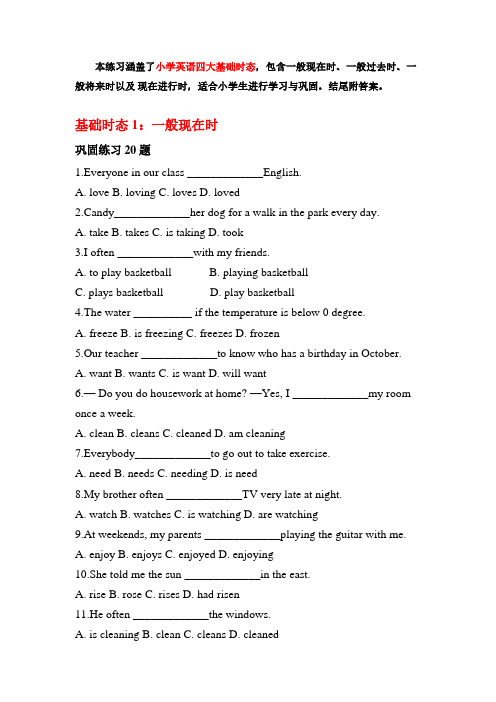
本练习涵盖了小学英语四大基础时态,包含一般现在时、一般过去时、一般将来时以及现在进行时,适合小学生进行学习与巩固。
结尾附答案。
基础时态1:一般现在时巩固练习20 题1.Everyone in our class _____________English.A. loveB. lovingC. lovesD. loved2.Candy_____________her dog for a walk in the park every day.A. takeB. takesC. is takingD. took3.I often _____________with my friends.A. to play basketballB. playing basketballC. plays basketballD. play basketball4.The water __________ if the temperature is below 0 degree.A. freezeB. is freezingC. freezesD. frozen5.Our teacher _____________to know who has a birthday in October.A. wantB. wantsC. is wantD. will want6.— Do you do housework at home? —Yes, I _____________my room once a week.A. cleanB. cleansC. cleanedD. am cleaning7.Everybody_____________to go out to take exercise.A. needB. needsC. needingD. is need8.My brother often _____________TV very late at night.A. watchB. watchesC. is watchingD. are watching9.At weekends, my parents _____________playing the guitar with me.A. enjoyB. enjoysC. enjoyedD. enjoying10.She told me the sun _____________in the east.A. riseB. roseC. risesD. had risen11.He often _____________the windows.A. is cleaningB. cleanC. cleansD. cleaned12.Jenny always _____________her teeth after dinner.A. brushB. to brushC. brushesD. brushed13.They_____________the red picture.A. are likeB. are likingC. don't likeD. doesn't like14.My brother always _____________to school at 7 o'clock.A. goB. goesC. are goingD. went15.The sun _____________in the east.A. riseB. risesC. roseD. risen416.The teacher said the day _____________longer in summer.A. will becomeB. becameC. becomesD. is going to become17.Jenny often _____________a uniform at school.A. wearB. wearsC. wearingD. wore18.The plane _____________at 7 a.m. tomorrow.A. leaveB. leavesC. leavingD. left19.Sam often _____________on Saturdays.A. is going to play footballB. plays footballC. is playing footballD. play football20.Mike often _____________on Mondays.A. does the cleaningB. plays the footballC. plays violinD. play violin基础时态 2:现在进行时巩固练习20 题1.He_____________right now.A. is studyingB. studiesC. studyD. studied2.The children aren't _____________their homework at the moment.A. doB. doesC. doingD. be doing3.It's seven now. Tom's family _____________TV.A. watchingB. are watchingC. watchD. was watched4.Listen! Lucy _____________in her room. She often_____________songs in the morning.A. sings; singsB. sings; is singingC. is singing; singsD. singing; sings5. — What is the girl under the tree doing?— She _____________a book.A. readsB. is readingC. looks atD. is looking6.Look at the picture, the ducks _____________in the lake.A. swimmingB. is swimmingC. swimD. are swimming7.Tom likes maths very much. Look! He _____________ a question in the math class now.A. asksB. is askingC. is going to askD. asking8.The children aren't in the classroom. They _____________ on the playground.A. playB. playingC. are playingD. plaiing9.Look! The children _____________ kites over there.A. are flyingB. is flyingC. flyD. flies10.She is _____________ now. She can _____________ well.A. dance; dancingB. dancing; danceC. dancing; dancesD. dancing; dancing11.Listen! Who _____________ in the next room?A. singB. singsC. singingD. is singing12.Koko____________bananas, but now she _____________a banana.A. doesn't like; eatsB. don't like; is eatingC. doesn't like; is eatingD. isn't like; is eating13.Look! Jane _____________with her friends now.A. talkB. talksC. talkingD. is talking14.—Where are the farmers?—They _____________holes on the hill. They want to plant some trees.A. dugB. digC. will digD. are digging15.---What _____________Miss Wang_____________?---She's cooking.A. are;workingB. is; doingC. does; doD. are; doing16.Be quiet! The babies_____________.A. sleepB. are sleepingC. sleptD. is sleeping17.Linda, your father _____________now. Go and _____________the radio.A. sleeps, turn onB. is sleeping, turn upC. sleeping, turn downD. is sleeping, turn off18.It always _____________in spring. It is _____________now.A. rains; rainB. rainy; rainsC. rains; rainingD. raining; raining19.—What _____________you_____________?— I am painting.A. is; doingB. are; doingC. do; doD. does; doing20.— Does Ben often _____________his mother do housework? —Yes. Look! He is _____________the table.A. helps; cleanB. help; cleaningC. help; cleansD. helps; cleaning基础时态3:一般过去时巩固练习20 题1.I_____________badminton yesterday afternoon.A. playB. am playingC. will playD. playedst Sunday, I had much homework, so I _____________at home and _____________my homework.A. stayed; doB. stayed; didC. stay; doD. stay; did3.We_____________my grandparents last weekend.A. are visitingB. visitC. visitedD. visits4.We_____________football, but we _____________tennis yesterday.A. didn't play, playB. not play, playC. don't play, playedD. didn't play, played5.—What did you do in an English class?—We acted, _____________and played games in English.A. sangB. singingC. singsD. sing6.We went to Beijing Zoo and _____________many lovely animals there.A. seeB. sawC. eatD. ate7.The children _____________some bread from the supermarket last night.A. baughtB. bringC. boughtD. buy8.I_____________to the party last weekend.A. didn't goB. didn't wentC. wasn't goD. wasn't went9.I_____________TV and _____________my homework last evening.A. watches; doB. am watching; am doingC. watched; didD. will watch;do10.My mum _____________me some bread ten minutes ago. Would you like some, please?A. bringB. bringsC. broughtD. bringing11.—_____________you wash your clothes last weekend?— No, I_____________.A. Do; don'tB. Are; aren'tC. Did; didn'tD. Are; am not12.My mother _____________busy last night.A. isB. wasC. we reD. are13.They_____________books last night.A. readB. readsC. lookD. did814.It_____________all day. We couldn't play football in the playground.A. rainB. rainsC. rainedD. didst month, I _____________two big boys climbing the wall.A. seeB. sawC. seeingD. did16.Janet_____________an interesting book at the library last weekend.A. readsB. readC. will readD. readed17.Mike climbed mountains by himself. He _____________a camel.A. didn't rideB. rodeC. riddenD. rides18._____________he have any hobbies when he was a little boy? Yes, he liked _____________the piano.A. Did; playingB. Does; playingC. Does; playsD. Does; to play19.We_____________a kite and played games in the park.A. flyB. fliesC. flyingD. flew20.—Where _____________you yesterday?—We _____________kites in the park.A. did; flewB. were; flyC. were; flewD. did; fly基础时态4:一般将来时巩固练习20 题1.We are going to play tennis_____________.A. tomorrowB. nowC. yesterdayD. last Monday2.The baby is hungry and thirsty. He is going to_____________.A. cryB. cryingC. criedD. cries3.Jeff will _____________the Palace Museum tomorrow.A. visitB. visitingC. visitedD. visits4.Mary_____________with me next week.A. is playingB. playedC. will playD. plays5. Lingling _____________swimming tomorrow afternoon.A. learnB. learnsC. learntD. is going to learn6.In 15 years, Kitty _____________in Shanghai.A. liveB. livesC. will liveD. lived7.— Danny, will you do your homework tomorrow?— No, I_____________.A. don'tB. wasn'tC. won'tD. are not8.There_____________a sports meeting the day after tomorrow.A. will haveB. will going to beC. is going to beD. will go to be9.—What will you do for your mum?—_____________A. I cook noodles.B. He cooks noodles.C. I will cook noodles.D. I am cooking.10.There_____________a football match tomorrow.A. wasB. will beC. isD. has been11.It is going to be New Year's Day_____________. We are very happy.A. next weekB. last weekC. nowD. yesterday12.My mother and I _____________the art museum tomorrow.A. wentB. are going toC. is going toD. am going to13.David likes _____________hiking. He _____________hiking tomorrow.A. goes; goesB. going; goingC. going; will goD. go; goes14.—_____________your sister join the English Speaking Contest?— No, she_____________.A. Will; willB. Do; won'tC. Will; won'tD. Do; don't15.Tim is going to _____________his grandparents this weekend.A. visitsB. visitingC. visitD. visited16.The old man_____________90 years old next year.A. will beB. is going to beC. wasD. is17._____________the visitors _____________have a rest?A. Will; goingB. Will; goC. Are; going toD. Do; going18.There_____________a football game tomorrow afternoon.A. wasB. is going to beC. is going to haveD. will have19.If it _____________rain tomorrow I _____________go travelling with my parents.A. don't; won'tB. won't; don'tC. doesn't; willD. doesn't; won't20.I am going to go swimming_____________.A. next weekB. last weekC. two weeks agoD. now四大基础时态综合练习1.We are going to _____________a sports meeting next Friday.A. hasB. haveC. having2.I_____________the library to read some books.A. am going toB. am goingC. be going to3.I always _____________my hair before I go to bed.A. washB. washesC. washing4.—Will you _____________fish _____________me?—Yes, I_____________.A. cooking; to; willB. cook; for; doC. cook; for; will5.—What did you _____________this morning?—I _____________some bread for breakfast.A. eat; ateB. ate; eatC. ate; ate6.—Where _____________Mike and his father _____________this morning?—They went to a farm.A. did;doB. did;wentC. were;7.Listen! Those girls _____________about Harry Potter. Let's join them!A. are talkingB. talkC. will talk8.I_____________to the party last weekend.A. didn't goB. didn't wentC. wasn't go9.The ice _____________some water just now.A. turn toB. turned intoC. get into10.We sometimes _____________art lessons there.A. areB. hasC. have11.He does well in _____________football, but he _____________do well before.A. play; doesB. play; didn'tC. playing; didn't12._____________your friend _____________new trousers?A. Does; hasB. Does; haveC. Do; has13.It's 7:30 p.m. . The Smiths _____________TV in the living room.A. watchB. is watchingC. are watching14.—Where _____________you yesterday?— I _____________at school.A. were; wereB. was; wereC. were; was15.They are going to _____________there _____________a few days.A. stays, ofB. stay, onC. stay, for16.Can't you see? Leo _____________over there with his father.A. runB. is runningC. runs17.—_____________the young girl _____________the old man clean his room every day?—Yes, she does.A. Does, helpB. Did, helpC. Do, helps18.—Do you like apples?—No, _____________.A. I doB. I don'tC. I am19.—_____________you _____________free tomorrow?— No. I _____________free the day after tomorrow.A. Are; going to; willB. Are; going to be;will beC. Are; going to; will be20.Now we _____________a model house.A. are makingB. madeC. was making答案基础时态1:一般现在时练习1.C2.B3.D4.C5.B6.A7.B8.B9.A 10.C 11.C 12.C 13.C 14.B 15.B 16.C 17.B 18.B 19.B 20.A基础时态2:现在进行时练习1.A2.C3.B4.C5.B6.D7.B8.C9.A 10.B 11.D 12.C 13.D 14.D 15.B 16.B 17.D 18.C 19.B 20.B基础时态3:一般过去时练习1.D2.B3.C4.D5.A6.B7.C8.A9.C 10.C 11.C 12.B 13.A 14.C 15.B 16.B 17.A 18.A 19.D 20.C基础时态4:一般将来时练习1.A2.A3.A4.C5.D6.C7.C8.C9.C 10.B 11.A 12.B 13.C 14.C 15.C 16.A 17.C 18.B 19.C 20.A四大基础时态综合练习1.B2.A3.A4.C5.A6.C7.A8.A9.B 10.C 11.C 12.B 13.C 14.C 15.C 16.B 17.A 18.B 19.B 20.A。
初二英语四大时态练习题

初二英语四大时态练习题一、一般现在时练习题1. 完成句子:a) My sister _________ (watch) TV every evening.b) They often ___________ (go) to the park on weekends.c) We ________ (like) to play basketball in our free time.d) I _______ (read) a book every night before bed.2. 改错题:将下列句子中错误的地方划线并改正。
a) Tom and Jerry is a funny cartoon. ____________________b) She go to school by bus every day. ____________________c) We plays soccer every Saturday. ____________________d) The cat has two black and white colors. __________________3. 选择题:选择正确的动词形式填入空格。
a) Lucy __________ (brush / brushes) her teeth every morning.b) They ___________ (visit / visits) their grandparents twice a month.c) My dog ___________ (bark / barks) loudly at strangers.d) He usually ___________ (washes / wash) his car on Sundays.二、一般过去时练习题1. 完成句子:a) Yesterday, John __________ (play) soccer with his friends.b) We ___________ (visit) the museum last week.c) She _________ (buy) a new dress for the party.d) The teacher _________ (explain) the lesson carefully yesterday.2. 改错题:将下列句子中错误的地方划线并改正。
初一英语四种时态专项练习

一般现在时用法专练1人称:第一人称(I/we),第二人称(you/you),第三人称(he/she/it/they)动词:2、be 动词:am ,is, are,I固定与am搭配,you固定与are搭配,其它复数is 复数are.3、助动词:do ,does,第三人称单数要跟单数动词does.4、实义动词:第三人称单数要跟单数动词(have-has)5、疑问句:(1)一般疑问句:助动词开头或be 动词开关(2)特殊疑问句:疑问代词+一般疑问句开头一、用括号内动词的适当形式填空。
1. I (am)from China.2. Daniel and Tommy (be)from China.3. We (be) from China4. You (are)from China.5. They (be)from China.6. I (come)from China.7. Daniel and Tommy (come) from China.8. He (come)from China9. You (come)from China.10. They (come)China.11、_______(do)you come from China?12、__________(do)he come from China.13、________(be)you a student.14、________(be)he a student.15、、Where______(do)you come from ?15、Where__________(do)he come from ?16、Where________(be)you from?.17、Where_______(be)he from?二、按照要求改写句子1. Daniel watches TV every evening.(改为否定句)2. I do my homework every day.(改为一般疑问句,作否定回答)3. She likes milk.(改为一般疑问句,作肯定回答)4. Amy likes playing computer games.(改为一般疑问句,作否定回答)5. We go to school every morning.(改为否定句)6. He speaks English very well.(改为否定句)7. I like taking photos in the park.(对划线部分提问)8. John comes from Canada.(对划线部分提问)9. She is always a good student.(改为一般疑问句,作否定回答)10. Simon and Daniel like going skating.(改为否定句)一般将来时专项练习二、几个用将来时的向征In the future,next ,in a week,tomorrow.,soon三、动词填空。
(完整版)小学英语四种时态知识点加练习

小学英语四种时态知识点加练习一、一般此刻时一. 意义:表示常常发生的事情,动作或存在的状态二 . 组成及变化1.be 动词的变化。
一定句:主语 +be(am,is,are)+ 其余。
如:I am a boy. 我是一个男孩。
否认句:主语 + be + not + 其余。
如: He is not a worker. 他不是工人。
一般疑问句: Be +主语 +其余。
如:-Are you a student?-Yes. I am. / No, I'm not.特别疑问句:疑问词+一般疑问句。
如:Where is my bike?2.行为动词的变化。
l 、当主语为第一,二人称及复数时,助动词为do一定句:主语 +动词原形 (+ 其余 )。
如:We often play basketball after school.否认句:主语 + don't+ 动词原形 (+其余 )。
如: we don’t play basketball after school.一般疑问句: Do + 主语 +动词原形 +其余 ?如:Do you often play basketball after school?Yes, we do. / No, we don't.特别疑问句:疑问词+以 do 开头的一般疑问句?如:What do you often do after school ?2、当主语为第三人称单数时,助动词为does一定句:主语 +动词三单式 (+其余 )。
如:He swims well.否认句:主语 + doesn ’t+动词原形 (+ 其余 )。
如: He doesn’t swim well..一般疑问句: Does +主语 +动词原形 +其余。
如: Does he swim well ?Yes, he does. / No, he doesn't.特别疑问句:疑问词+以 does开头的一般疑问句?如:How does your father go to work?三.第三人称单数的动词变化规则(只有在第三人称为主语的一定句中,动词才用三单式)(1) 多半动词直接加 s: runs gets likes collets takes plays climbs .(2) 结尾是 s, x, sh, ch, o,前为辅音字母 , 结尾加 es : watches teaches goes does washes crosses mixes brushes(3) 动词末端 y 前为辅音 :将 y 改为 i 加 es: study → studies fly → fliescarry → carries cry → cries但在 y 前假如为元音则直接加s: buys says四.时间标记: always , usually , often , sometimes ,every一般此刻时练习题I.用以下单词的适合形式填空1.We often___________(play) in the playground.2.He _________(get) up at six o’ clock.3.__________you _________(brush) your teeth every morning?4.What________________(do) he usually________________(do) after school?5.Danny ________________(study) English, Chinese, maths, science and Art at school.6.Mike sometimes __________(go) to the park with his sister.7.At eight at night, she __________(watch) TV with his parents.8.________ Mike________(read) English every day?9.How many lessons_________your classmates________(have) on Monday?10.What time_________his mother_________(do) the housework?II.改句子1.Do you often play football after school? (改为一定句)2.I have many books. (改为否认句)3.Gao Shan ’ s sister likes playing table tennis(改为否认句)4.She lives in a small town near New York. (改为一般疑问句)5.I watch TV every day. (改为一般疑问句)6.We have four lessons.(改为否认句)7.Nancy doesn’ t run fast(改为一定句)二、此刻进行时一、观点此刻进行时表示说话时正在进行或发生的动作 ,也可表示目前一段时间内的活动或现阶段正在进行的动作。
四个基本时态+句型转换练习
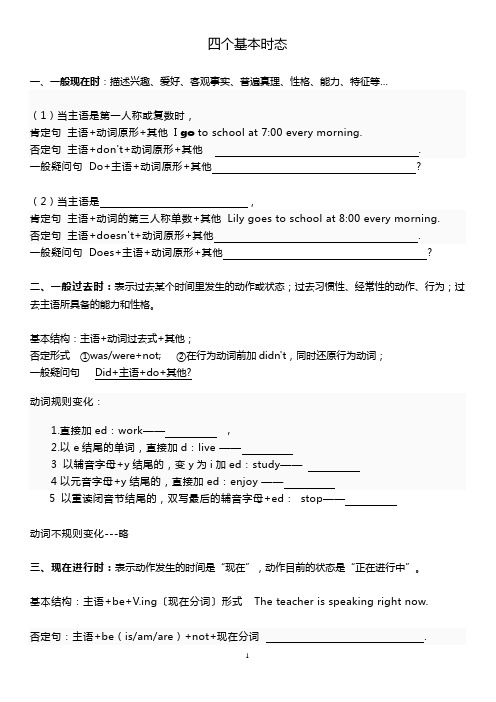
四个基本时态一、一般现在时:描述兴趣、爱好、客观事实、普遍真理、性格、能力、特征等…(1)当主语是第一人称或复数时,肯定句主语+动词原形+其他I go to school at 7:00 every morning.否定句主语+don't+动词原形+其他.一般疑问句Do+主语+动词原形+其他?其他?二、一般过去时:表示过去某个时间里发生的动作或状态;过去习惯性、经常性的动作、行为;过去主语所具备的能力和性格。
基本结构:主语+动词过去式+其他;否定形式①was/were+not; ②在行为动词前加didn't,同时还原行为动词;一般疑问句Did+主语+do+其他?5 以重读闭音节结尾的,双写最后的辅音字母+ed:stop——动词不规则变化---略三、现在进行时:表示动作发生的时间是“现在”,动作目前的状态是“正在进行中”。
基本结构:主语+be+V.ing〔现在分词〕形式The teacher is speaking right now.+Sth? .四、一般将来时:表示将来某一时刻的动作或状态,或将来某一段时间内经常的动作或状态。
常常和表示将来的时间状语连用。
如:tomorrow(明天),next week(下周),from now on(从现在开始);in the future(将来)等。
(1)“will+动词原形”表示将来发生的事情,用于征求对方的意见或表示客气的邀请。
We will go to Disneyland next month.(2).“be going to+动词原形”表示即将发生的或最近打算进行的事。
例如We're going to meet outside the school gate. 我们打算在校门口见面。
Look! . 瞧!快下雨了。
(3)be about to 表示即将发生的动作,意为:很快,马上。
They leave. (=They're going to leave.) 他们就要走了。
四大时态的句式转换练习(含答案)
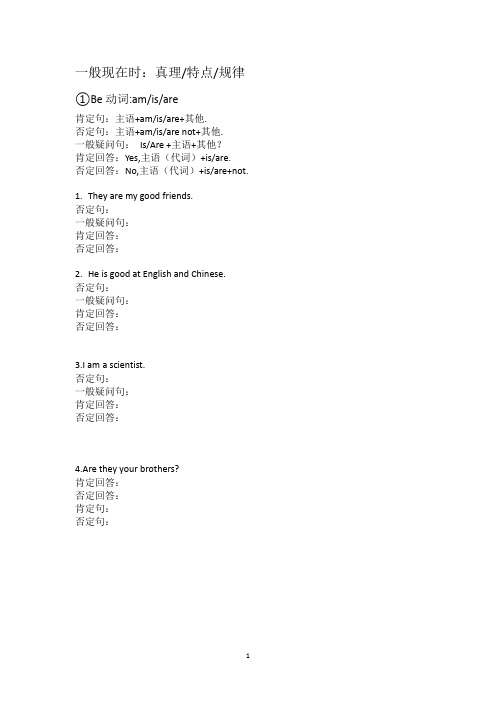
一般现在时:真理/特点/规律①Be动词:am/is/are肯定句:主语+am/is/are+其他.否定句:主语+am/is/are not+其他.一般疑问句:Is/Are +主语+其他?肯定回答:Yes,主语(代词)+is/are.否定回答:No,主语(代词)+is/are+not.1.They are my good friends.否定句:一般疑问句:肯定回答:否定回答:2.He is good at English and Chinese.否定句:一般疑问句:肯定回答:否定回答:3.I am a scientist.否定句:一般疑问句:肯定回答:否定回答:4.Are they your brothers?肯定回答:否定回答:肯定句:否定句:1.Answers:否定句: They aren’t my good friends.一般疑问句:Are they your good friends?肯定回答:Yes, they are.否定回答:No,they aren’t.2.Answers:否定句: He isn’t good at English and Chinese.一般疑问句:Is he good at English and Chinese?肯定回答:Yes, he is.否定回答:No, he isn’t.3.Answers:否定句: I am not a scientist.一般疑问句:Are you a scientist?肯定回答:Yes, I am.否定回答:No, I am not.4.Answers:肯定回答:Yes,they are.否定回答:No,they aren’t.肯定句:They are my brothers.否定句:They aren’t my brothers.②行为动词:V(动词原形表示复数)/ V-s/es(表示单数)肯定句:主语+V/V-s/es+其他.否定句:主语+don’t/doesn’t +V(动词原形)+其他.一般疑问句:Do/Does +主语+V(动词原形)其他?肯定回答:Yes,主语(代词)+do/does.否定回答:No,主语(代词)+do/does+not.动词变单数的规则:1.+s2.s,x,ch,sh,o结尾,+es3.辅音字母+y结尾,去y为i,+es4.元音字母+y结尾,+s5.特殊情况:have-has1.Mike does his homework every day.否定句:一般疑问句:肯定回答:否定回答:特殊疑问句:2.My grandma watches TV in the evening.否定句:一般疑问句:肯定回答:否定回答:特殊疑问句:3.Mary and I have dinner in the restaurant.否定句:一般疑问句:肯定回答:否定回答:特殊疑问句:4.Does your penfriend live in Beijing?肯定回答:否定回答:肯定句:否定句:1.Answers:否定句:Mike doesn’t do his homework every day.一般疑问句:Does Mike do his homework every day?肯定回答:Yes,he does.否定回答:No ,he doesn’t.特殊疑问句:What does Mike do every day?2.Answers:否定句:My grandmother doesn’t watch TV in the evening.一般疑问句:Does your grandmother watch TV in the evening?肯定回答:Yes,she does.否定回答:No ,she doesn’t.特殊疑问句:When does your grandmother watch TV in the evening?3.Answers:否定句:Mary and I doesn’t have dinner in the restaurant.一般疑问句:Does you have dinner in the restaurant?肯定回答:Yes,we do.否定回答:No ,we don’t.特殊疑问句:Where do you have dinner?4.Answers:肯定回答:Yes,he/she does.否定回答:Yes,he/she doesn’t.肯定句:My penfriend lives in Beijing.否定句:My penfriend doesn’t live in Beijing.现在进行时:正在发生的事情am/is/are+doing肯定句:主语+am/is/are+doing+其他.否定句:主语+am/is/are+not +doing+其他.一般疑问句:Is/Are +主语+doing+其他?肯定回答:Yes,主语(代词)+is/are.否定回答:No,主语(代词)+is/are+not.动词变ing的规则:1.+ing2.不发音字母e结尾,去e+ing.3.重读的辅元辅结尾,双写最后一个辅音字母再加ing.4.以ie结尾,去ie为y+ing.1.My brother is making kites.否定句:一般疑问句:肯定回答:否定回答:特殊疑问句:2.The students are listening to their teacher carefully.否定句:一般疑问句:肯定回答:否定回答:特殊疑问句:3.I am doing my homework at the moment.否定句:一般疑问句:肯定回答:否定回答:4.Are they taking picture?肯定回答:否定回答:肯定句:否定句:1.Answers:否定句:My brother isn’t making kites.一般疑问句:Is your brother making kites?肯定回答:Yes,he is.否定回答:No,he isn’t.特殊疑问句:What is he doing?2.Answers:否定句:The students aren’t listening to their teacher carefully.一般疑问句: Are the students listening to their teacher carefully?肯定回答:Yes,they are.否定回答:No,they aren’t.特殊疑问句:Who are listening to their teacher carefully?3.Answers:否定句:I am not doing my homework at the moment.一般疑问句:Are you doing you homework at the moment?肯定回答:Yes,I am.否定回答:No,I am not.4.Answers:肯定回答:Yes,they are.否定回答:No,they aren’t.肯定句:They are taking picture.否定句:They aren’t taking picture.一般过去时:过去发生的事情①be动词:was/were肯定句:主语+was/were+其他.否定句:主语+was/were+not +其他.一般疑问句:Was/Were +主语+其他?肯定回答:Yes, 主语+was/were.否定回答:No,主语+was/were not.1. They were my good friends three years ago.否定句:一般疑问句:肯定回答:否定回答:2.He was good at English and Chinese last year.否定句:一般疑问句:肯定回答:否定回答:3.I was a primary student in 2000.否定句:一般疑问句:肯定回答:否定回答:特殊疑问句:4.Were there five books on the desk a moment ago?否定句:肯定句:否定回答:肯定回答:1.Answers:否定句:They weren’t my good friends three years ago.一般疑问句:Were they your good friends three years ago?肯定回答:Yes,they were.否定回答:No,they weren’t.2.Answers:否定句:He wasn’t good at English and Chinese last year.一般疑问句:Was he good at English and Chinese last year?肯定回答:Yes,he was.否定回答:No,he wasn’t.3.Answers:否定句:I wasn’t a primary student in 2000.一般疑问句:Were you a primary student in 2000?肯定回答:Yes,I was.否定回答:No,I wasn’t.特殊疑问句:When were you a primary student?4.Answers:否定句:There were five books on the desk a moment ago.肯定句:There weren’t five books on the desk a moment ago.否定回答:Yes,there were.肯定回答:No,there weren’t.②行为动词:V(-ed)(规则变化)/ V (不规则变化:见一个记一个)肯定句:主语+V-ed+其他.否定句:主语+didn’t +V(动词原形)+其他.一般疑问句:Did +主语+V(动词原形)其他?肯定回答:Yes,主语(代词)+did.否定回答:No,主语(代词)+did+not.行为动词变过去式的规则变化:1.+ed2.以e结尾,+d3.辅音字母+y结尾,去y为i,+ed4.元音字母+y结尾,+ed1.Mike did his homework last night.否定句:一般疑问句:肯定回答:否定回答:特殊疑问句:2.My grandma watched TV this morning.否定句:一般疑问句:肯定回答:否定回答:特殊疑问句:3.Mary and I had dinner in the restaurant.否定句:一般疑问句:肯定回答:否定回答:4.Did they go shopping last week ?否定句:肯定句:否定回答:肯定回答:1.Answers:否定句:Mike didn’t do his homework last night.一般疑问句:Did Mike do his homework last night?肯定回答:Yes,he did.否定回答:No,he didn’t.特殊疑问句:What did Mike do last night?2.Answers:否定句:My grandma didn’t watch TV this morning.一般疑问句:Did your grandma watch TV this morning?肯定回答:Yes,she did.否定回答:No,he didn’t.特殊疑问句:When did your grandma watch TV?3.Answers:否定句:Mary and I didn’t have dinner in the restaurant.一般疑问句:Did Mary and you have dinner in the restaurant?肯定回答:Yes,we did.否定回答:No,we didn’t.4.Answers:否定句:They didn’t go shopping last week.肯定句:They went shopping last week.否定回答:No,they didn’t.肯定回答:Yes,they did.一般将来时:未来发生的事情①am/is /are going to do/be肯定句:主语+am/is/are going to do/be+其他.否定句:主语+am/is/are+not+ going to do/be+其他.一般疑问句:Is/Are +主语+going to do/be+其他?肯定回答:Yes,主语+is/are.否定回答:No,主语+is/are+not.1.I am going to see a film tomorrow.否定句:一般疑问句:肯定回答:否定回答:特殊疑问句:2.He is going to buy a bike the day after tomorrow.否定句:一般疑问句:肯定回答:否定回答:特殊疑问句:3.There is going to be a party in our school.否定句:一般疑问句:肯定回答:否定回答:特殊疑问句:4.Are they going to have a plan on holiday?否定句:肯定句:否定回答:肯定回答:否定句:I am not going to see a film tomorrow.一般疑问句:Are you going to see a film tomorrow?肯定回答:Yes,I am.否定回答:No,I am not.特殊疑问句:What are you going to do tomorrow?2.Answers:否定句:He isn’t going to buy a bike the day after tomorrow.一般疑问句:Is he going to buy a bike the day after tomorrow?肯定回答:Yes,he is.否定回答:No,he isn’t.特殊疑问句:When is he going to buy a bike?3.Answers:否定句:There isn’t going to be a party in our school.一般疑问句:Is there going to be a party in your school?肯定回答:Yes there is.否定回答:No,there isn’t.特殊疑问句:Where is there going to be a party?4.Answers:否定句:They aren’t going to have a plan on holiday.肯定句:They are going to have a plan on holiday.否定回答:No,they aren’t.肯定回答:Yes,they are.肯定句:主语+will be/do+其他.否定句:主语+will +not +be/do+其他.一般疑问句:Will +主语+be/do+其他?肯定回答:Yes,主语+will.否定回答:No,主语+will+not.1.He will not go to school tomorrow.肯定句:一般疑问句:肯定回答:否定回答:2.I will be free this afternoon.否定句:一般疑问句:肯定回答:否定回答:3.There will be an exam next week.否定句:一般疑问句:肯定回答:否定回答:特殊疑问句:4.Will you eat roast ducks in Beijing?否定句:肯定句:否定回答:肯定回答:1.Answers:肯定句:He will go to school tomorrow.一般疑问句:Will he not go to school tomorrow?肯定回答:Yes,he will.否定回答:No,he won’t.2.Answers:否定句:I won’t be free this afternoon一般疑问句:Will you be free this afternoon?肯定回答:Yes,I will.否定回答:No,I won’t.3.Answers:否定句:There won’t be an exam next week.一般疑问句:Will there be an exam next week?肯定回答:Yes,there will.否定回答:No,there won’t.特殊疑问句:When will there be an exam?4.Answers:否定句:I won’t eat roast ducks in Beijing.肯定句:I will eat roast ducks in Beijing.否定回答:Yes,I will.肯定回答:No,I won’t.。
小学英语四大时态总结及练习题

小学英语四大时态总结及练习题1. 简单现在时(Simple Present Tense)用法:表示现在正在进行的事情,或者经常性、习惯性的动作或状态。
构成:主语+ 动词原形+ 其他肯定句:I play basketball every day.否定句:I don't play basketball every day.一般疑问句:Do you play basketball every day?练习题:1. The sun (rise) in the east.2. We (love) our parents very much.3. (Do) you like to eat ice cream?4. Tom (not like) to go to school.5. They (visit) Beijing last year.2. 简单过去时(Simple Past Tense)用法:表示在过去某个时间点已经结束的动作或状态。
构成:主语+ 动词过去式+ 其他肯定句:I played basketball yesterday.否定句:I didn't play basketball yesterday.一般疑问句:Did you play basketball yesterday?练习题:1. Mary (go) to the park yesterday.2. We (have) a party last night.3. (Did) you see the movie yesterday?4. Lucy (not want) to go to the zoo last week.5. They (visit) their grandparents last weekend.3. 现在进行时(Present Continuous Tense)用法:表示正在进行的动作。
构成:主语+ be动词(am, is, are)+ 动词ing + 其他肯定句:I am playing basketball now.否定句:I am not playing basketball now.一般疑问句:Are you playing basketball now?练习题:1. My sister (watch) TV at the moment.2. We (not study) English now.3. (Is) he swimming in the river?4. Lucy (not listen) to music now.5. They (play) volleyball in the park.4. 将来时(Future Tense)用法:表示将要发生的动作或状态。
英语四大时态练习题
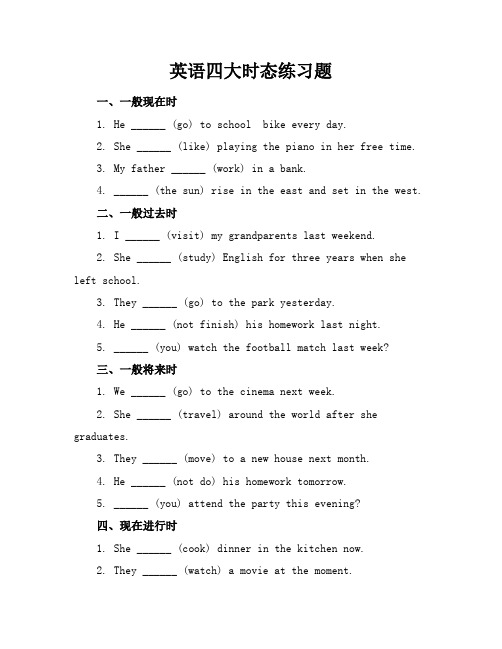
英语四大时态练习题一、一般现在时1. He ______ (go) to school bike every day.2. She ______ (like) playing the piano in her free time.3. My father ______ (work) in a bank.4. ______ (the sun) rise in the east and set in the west.二、一般过去时1. I ______ (visit) my grandparents last weekend.2. She ______ (study) English for three years when she left school.3. They ______ (go) to the park yesterday.4. He ______ (not finish) his homework last night.5. ______ (you) watch the football match last week?三、一般将来时1. We ______ (go) to the cinema next week.2. She ______ (travel) around the world after she graduates.3. They ______ (move) to a new house next month.4. He ______ (not do) his homework tomorrow.5. ______ (you) attend the party this evening?四、现在进行时1. She ______ (cook) dinner in the kitchen now.2. They ______ (watch) a movie at the moment.3. He ______ (not listen) to music while studying.4. I ______ (drive) to work this morning.五、综合练习1. When he ______ (arrive) at the airport, his flight______ (already take off).2. If it ______ (rain) tomorrow, we ______ (cancel) the picnic.3. While she ______ (walk) in the park, she ______ (meet) an old friend.4. They ______ (plan) to go hiking next weekend, but they ______ (change) their mind.5. Look! The children ______ (play) football in the yard.六、一般现在时与一般过去时的对比1. He usually ______ (eat) breakfast at 7 a.m., but yesterday he ______ (have) it at 8 a.m.2. She ______ (live) in a small town before she moved to the city.3. They ______ (drive) to work together, but today he______ (take) the bus.4. We ______ (meet) every weekend for coffee, but last week we ______ (not see) each other.5. My cat ______ (sleep) on the sofa, but now it ______ (play) with its toy.七、一般将来时与现在进行时的对比1. Right now, she ______ (prepare) for the party that______ (start) in an hour.2. He ______ (promise) to call you as soon as he ______ (arrive) home.3. They ______ (plan) to go on vacation next month, but they ______ (pack) their bags yet.4. I ______ (hope) to finish this book the end of the week, but I ______ (read) very slowly.5. You ______ (not need) to worry about the test because you ______ (study) hard.八、现在进行时与一般过去时的对比1. While I ______ (walk) in the park, I ______ (see) a friend from high school.2. They ______ (not understand) the lecture because they ______ (chat) during the whole time.3. She ______ (clean) the house all morning, but it still ______ (look) messy.5. We ______ (enjoy) the concert last night, especially when they ______ (play) our favorite song.九、混合时态练习1. By the time you ______ (read) this letter, I ______ (leave) for the airport.2. If it ______ (not rain) tomorrow, we ______ (go) to the beach.3. She ______ (say) she ______ (meet) us at the restaurant, but she ______ (not show up).4. They ______ (be) happy when they ______ (find) out that their team ______ (win) the match.5. I ______ (think) I ______ (lose) my keys, but then I ______ (remember) where I ______ (put) them.答案一、一般现在时1. goes2. likes3. works4. The sun rises5. do not have二、一般过去时1. visited2. had studied3. went4. did not finish5. Did you watch三、一般将来时1. will go2. will travel3. will move4. will not do5. Will you attend四、现在进行时1. is cooking2. are watching3. is not listening4. was driving5. Is your brother playing五、综合练习1. arrived, had already taken off2. rains, will cancel3. was walking, met4. plan, have changed5. are playing六、一般现在时与一般过去时的对比1. eats, had2. lived3. drive, took4. meet, did not see5. sleeps, is playing七、一般将来时与现在进行时的对比1. is preparing, starts2. promises, arrives3. plan, have not packed4. hope, am reading5. do not need, have studied八、现在进行时与一般过去时的对比1. was walking, saw2. did not understand, were chatting3. has been cleaning, still looks4. was trying, did not succeed5. enjoyed, played九、混合时态练习1. read, will have left2. does not rain, will go3. said, would meet, did not show up4. were, found, had won5. thought, had lost, remembered, had put。
完整版)教科版小学英语四种时态综合练习
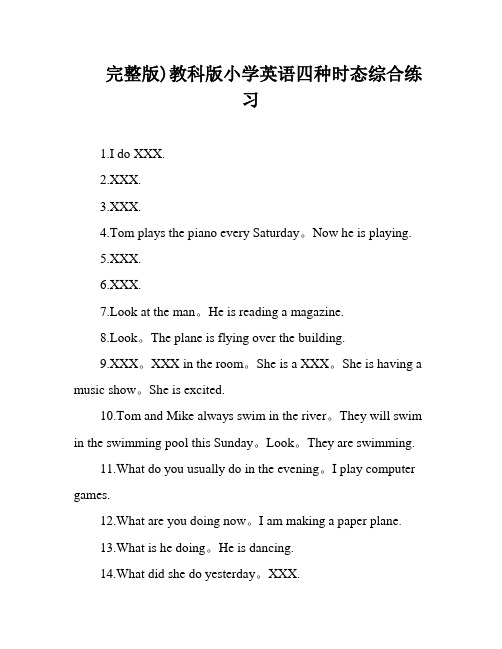
完整版)教科版小学英语四种时态综合练习1.I do XXX.2.XXX.3.XXX.4.Tom plays the piano every Saturday。
Now he is playing.5.XXX.6.XXX.7.Look at the man。
He is reading a magazine.8.Look。
The plane is flying over the building.9.XXX。
XXX in the room。
She is a XXX。
She is having a music show。
She is excited.10.Tom and Mike always swim in the river。
They will swim in the swimming pool this Sunday。
Look。
They are swimming.11.What do you usually do in the evening。
I play computer games.12.What are you doing now。
I am making a paper plane.13.What is he doing。
He is dancing.14.What did she do yesterday。
XXX.15.XXX。
Yes。
she does.16.Do you like fishing。
No。
I don't。
I like swimming。
XXX.17.How does your father go to work every day。
He goes by bike。
But it's cold today。
He took the No.21 bus。
and he went to work by XXX.18.Does the monkey like climbing trees。
小学英语四大时态
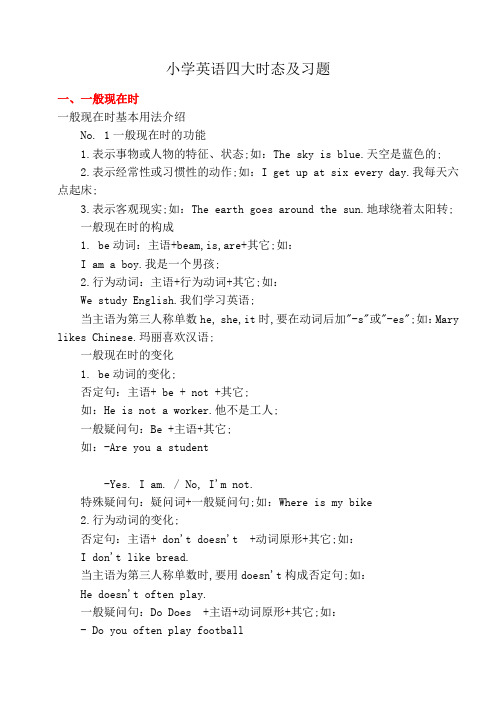
小学英语四大时态及习题一、一般现在时一般现在时基本用法介绍No. 1一般现在时的功能1.表示事物或人物的特征、状态;如:The sky is blue.天空是蓝色的;2.表示经常性或习惯性的动作;如:I get up at six every day.我每天六点起床;3.表示客观现实;如:The earth goes around the sun.地球绕着太阳转;一般现在时的构成1. be动词:主语+beam,is,are+其它;如:I am a boy.我是一个男孩;2.行为动词:主语+行为动词+其它;如:We study English.我们学习英语;当主语为第三人称单数he, she,it时,要在动词后加"-s"或"-es";如:Mary likes Chinese.玛丽喜欢汉语;一般现在时的变化1. be动词的变化;否定句:主语+ be + not +其它;如:He is not a worker.他不是工人;一般疑问句:Be +主语+其它;如:-Are you a student-Yes. I am. / No, I'm not.特殊疑问句:疑问词+一般疑问句;如:Where is my bike2.行为动词的变化;否定句:主语+ don't doesn't +动词原形+其它;如:I don't like bread.当主语为第三人称单数时,要用doesn't构成否定句;如:He doesn't often play.一般疑问句:Do Does +主语+动词原形+其它;如:- Do you often play football- Yes, I do. / No, I don't.当主语为第三人称单数时,要用does构成一般疑问句;如:- Does she go to work by bike- Yes, she does. / No, she doesn't.特殊疑问句:疑问词+一般疑问句;如:How does your father go to work 动词+s的变化规则1.一般情况下,直接加-s,如:cook-cooks, milk-milks2.以s. x. sh. ch. o结尾,加-es,如:guess-guesses, wash-washes,watch-watches, go-goes3.以“辅音字母+y”结尾,变y为i, 再加-es,如:study-studies一般现在时用法专练:一、写出下列动词的第三人称单数drink ________ go _______ stay ________ make ________look _________ have_______ pass_______ carry ____come________ watch______ plant_______ fly ________study_______ brush________ do_________ teach_______二、用括号内动词的适当形式填空;1. He often ________have dinner at home.2. Daniel and Tommy _______be in Class One.3. We _______not watch TV on Monday.4. Nick _______not go to the zoo on Sunday.5. ______ they ________like the World Cup6. What _______they often _______do on Saturdays7. _______ your parents _______read newspapers every day8. The girl _______teach us English on Sundays.9. She and I ________take a walk together every evening.10. There ________be some water in the bottle.11. Mike _______like cooking.12. They _______have the same hobby.13. My aunt _______look after her baby carefully.14. You always _______do your homework well.15. I _______be ill. I’m stay ing in bed.16. She _______go to school from Monday to Friday.17. Liu Tao _______do not like PE.18. The child often _______watch TV in the evening.19. Su Hai and Su Yang _______have eight lessons this term.20. -What day _______be it today-It’s S aturday.三、按照要求改写句子1. Daniel watches TV every evening.改为否定句___________________________________________________2. I do my homework every day.改为一般疑问句,作否定回答________________________________________________________3. She likes milk.改为一般疑问句,作肯定回答___________________________4. Amy likes playing computer games.改为一般疑问句,作否定回答___________________________________________________5. We go to school every morning.改为否定句_______________________________________________________6. He speaks English very well.改为否定句___________________________________________________7. I like taking photos in the park.对划线部分提问________________________________________________________8. John comes from Canada.对划线部分提问___________________________________________________9. She is always a good student.改为一般疑问句,作否定回答________________________________________________________ 10. Simon and Daniel like going skating.改为否定句___________________________________________________五、改错划出错误的地方,将正确的写在横线上1. Is your brother speakEnglish __________________2. Does he likes goingfishing __________________3. He likes play games after class. __________________4. Mr. Wu teachs usEnglish. __________________5. She don’t do her homework on Sundays. _________________二、现在进行时1.现在进行时表示现在正在进行或发生的动作,也可表示当前一段时间内的活动或现阶段正在进行的动作;2.现在进行时的肯定句基本结构为be+动词ing.3.现在进行时的否定句在be后加not;4.现在进行时的一般疑问句把be动词调到句首;5.现在进行时的特殊疑问的基本结构为:疑问词 + be + 主语 + 动词ing但疑问词当主语时其结构为:疑问词 + be + 动词ing动词加ing的变化规则1.一般情况下,直接加ing,如:cook-cooking2.以不发音的e结尾,去e加ing,如:make-making, taste-tasting3.如果末尾是一个元音字母和一个辅音字母,双写末尾的辅音字母,再加ing,如:run-running, stop-stopping现在进行时专项练习:一、写出下列动词的现在分词:play________ run__________ swim _________make__________go_________ like________ write________ _ski___________read________ have_________ sing ________ dance_________put_________ see________ buy _________ love____________live_______ take_________ come ________ get_________stop_________ sit ________ begin________ shop___________二、用所给的动词的正确形式填空:boy __________________ drawa picture now.2. Listen .Some girls _______________ singin the classroom .3. My mother _________________ cook some nice food now.4. What _____ you ______ do now5. Look . They _______________ have an English lesson .____________not ,water the flowers now.the girls ________________dance in the classroom .is our granddaughter doingShe _________listen to music.9. It’s 5 o’clock now. We_____________havesupper nowwash clothesYes ,she is .三、句型转换:1. They are doing housework .分别改成一般疑问句和否定句__________________________________________________________________________________________________________________________2.The students are cleaning the classroom . 改一般疑问句并作肯定和否定回答__________________________________________________________________________________________________________________________________ 3.I’m playing the football in the playground .对划线部分进行提问_________________________________________________________________ 4.Tom is reading books in his study . 对划线部分进行提问三、将来时一、概念:表示将要发生的动作或存在的状态及打算、计划或准备做某事;句中一般有以下时间状语:tomorrow, next dayweek, month, year…,soon, the day after tomorrow后天等;二、基本结构:①be going to + do;②will+ do.三、否定句:在be动词am, is, are后加not或情态动词will后加not成won’t;例如:I’m going to have a picnic this afternoon.→ I’m not going to have a picnic this afternoon.四、一般疑问句: be或will提到句首,some改为any, and改为or,第一二人称互换;例如:We are going to go on an outing this weekend.→ Are you going to go on an outing this weekend五、对划线部分提问;一般情况,一般将来时的对划线部分有三种情况;1. 问人;Who 例如:I’m going to New York soon. →Who’s going to New York soon.2. 问干什么;What … do.例如: My father is going to watch a race with me this afternoon.→What is your father going to do with you this afternoon.3. 问什么时候;When.例如:She’s going to go to bed at nine.→W hen is she going to bed六、同义句:be going to = willI am going to go swimming tomorrow明天. = I will go swimming tomorrow. 练习:填空;1. 我打算明天和朋友去野炊;I_____ _______ _________ have a picnic with my friends.I ________ have a picnic with my friends.2.下个星期一你打算去干嘛我想去打篮球;What ________ ________ _________ _________ _________ next MondayI _______ ______ _____ play basketball.What _________ you do next MondayI ________ play basketball.3. 你妈妈这个周末去购物吗是,她要去买一些水果;_____ your mother _______ ________ go shopping this ___________Yes, she _________. She ______ ________ __________ buy some fruit.4. 你们打算什么时候见面;What time _______ you _________ __________ meet改句子;5. Nancy is going to go camping.改否定Nancy ________ going to go camping.6. I’ll go and join them.改否定I _______ go ______ join them.7. I’m going to get up at 6:30 tomorrow.改一般疑问句________ _______ ________ to get up at 6:30 tomorrow8. We will meet at the bus stop at 10:30.改一般疑问句_______ ________ meet at the bus stop at 10:30.9. She is going to listen to music after school.对划线部分提问________ _______ she ________ ________ _________ after school四.一般过去时:1.动词一般过去时,表示过去发生的事;be用was或用were, have,has变had;谓语动词过去式,过去时间作标志;一般动词加-ed,若是特殊得硬记;否定句很简单,主语之后didn’t添;疑问句也不难,did放在主语前;不含be动词时如果谓语之前有did,谓语动词需还原;动词若是was,were,否定就把not添;含be动词时疑问句也不难,要把was,were放在主语前;2.经常能见到一些表示过去的时间状语,如:yesterday,last week / month…,three days ago等;3、动词过去式;1、规则动词的过去式,是有规律可循的;具体的变化规则如下:1一般情况在动词词尾加-ed ,如:play--played, visit--visited2 不发音的e 结尾的动词,直接加-d ,如:live--lived, taste--tasted3 以辅音字母+y 结尾的动词,变y 为i ,再加-ed ,如:fly--flied,study--studied4 以重读闭音节只有一个辅音字母结尾的动词,双写词尾的辅音字母再加-ed ,如:swim-swimmed, stop-stopped.4.注意:规则动词词尾加-ed有三种读音:a. 在清辅音后读作t;如:asked, helped, watched, stoppedb. 在浊辅音和元音后读作d;如:enjoyed, studied, moved, calledc. 在t / d后读作id;如:wanted, needed5.、不规则变化要牢记:have/has -- had, do--did,am/is—was,are—were,go—went, eat—ate, see—saw,take--took, run--ran,send--sent, sleep--slept. read—read, hurt—hurt,一、单项选择:从下列各题后所给的四个选项中选择最佳答案填空;101. My father______ill yesterday.A. isn't B. aren't C. wasn't D. weren't2.______your parents at home last week﹖A. Is B. Was C. Are D. Were3. The twins______in Dalian last year. They______here now.A. are; were B. were; are C. was; are D. were; was 4.______your father at work the day_____yesterday﹖A. Was; before B. Is; before C. Was; after D. Is; after 5.—Who was on duty last Friday﹖—______.A. I am B. I was C. Yes, I was D. No, I wasn't6. I cleaned my classroom ___________A with three hoursB three hours agoC in three hoursD three hours before7. I came _______ my house two days ago .A back onB back toC to backD back8 . ___________ He did some reading at home.A What does your father do yesterday eveningB What does your brother do in the schoolC What did your brother do over the weekendD Where did your brother go last Sunday9. What did you do ________ I went to the movies.A next morning Bover the weekend C in the weekend D next Monday10. The koala sleeps _______,but gets up _________.A during the day; at the eveningB at day ;during nightC in the day ;during the eveningD during the day ; at night二、请用正确动词形式填空;101. I _________ have an exciting party last weekend.2. _________ she _________practice her guitar yesterdayNo, she _________.3. What ________ Tom ________ do on Saturday eveningHe ________watch TV and __________read an interesting book.4. They all _________go to the mountains yesterday morning.5. She _________not visit her aunt last weekend.She ________ stay at home and _________do some cleaning.6. When ________ you _________write this songI __________write it last year.7. My friend, Carol, ________study for the math test and ________practiceEnglish last night.三、翻译下列句子201. 我过了一个忙碌但却刺激的周末;I _________ _________ __________ __________ exciting weekend.2. Jenny喜欢看书;昨晚她看了一本英语书;Jenny likes _______ __________. She _________ an English book last night.3. Emma每天都看电视;可是昨天他没有看;Emma__________ TV every day. But he _________ ________ ________ yesterday.4. 上周六他们做什么了他们做作业和购物了;What ________ they _________ _________ SaturdayThey _________ __________ homework and _________ __________.5. 今天早上方方得做饭,因为他父亲不在家;This morning Fangfang ____ ____ ____ ____ because his father _____ _____ ____ yesterday.6. 你还有什么要说的 What _______ would you like _______ _______7. 放学别忘了向老师说声再见;Don’t forget ______ _______ _______ _______ the teacher.8. 为什么你昨晚没有看电视 Why _______ you _______ TV last night9. 他在打扫教室的时候,发现地上有块表;When he ______ the classroom, he ______ a watch on the ground.10. 他什么时候出生的 1980年;---When _______ he _______ ---_______ 1980.四、改写句子:201、Lucy did her homework at home.改否定句Lucy ________ _______ her homework at home.2、He found some meat in the fridge冰箱.变一般疑问句___________ he __________ ___________ meat in the fridge3、There was some orange in the cup.变一般疑问句_______ there _______ orange in the cup4. Frank read an interesting book about history. 一般疑问句_______ Frank _______ an interesting book about history5. Why not go out for a walk 同义句 _______ ________ ________ out for a walk6. Thomas spent RMB 10 on this book. 否定句 Thomas______ _____RMB 10 on this book.7. My family went to the beach last week. 划线提问________ ________ ________ family _______ last week8. I think she is Lily’s sister. 否定句;注意否定转移____________________9. Sally often does some reading in the morning. 否定句Sally _______ often ______ some reading in the morning.10. He is a tall, thin boy. 划线提问 _______ _______ he _______ ________五、改错题201.How is Jane yesterday _____________________2.He go to school by bus last week. ____________________________ 3.He often goes home at 6:00 last month. ____________________________ 4.I can fly kites seven years ago. ______________________________ 5.Did you saw him just now. ____________________________________。
小学四种时态讲解及专项练习
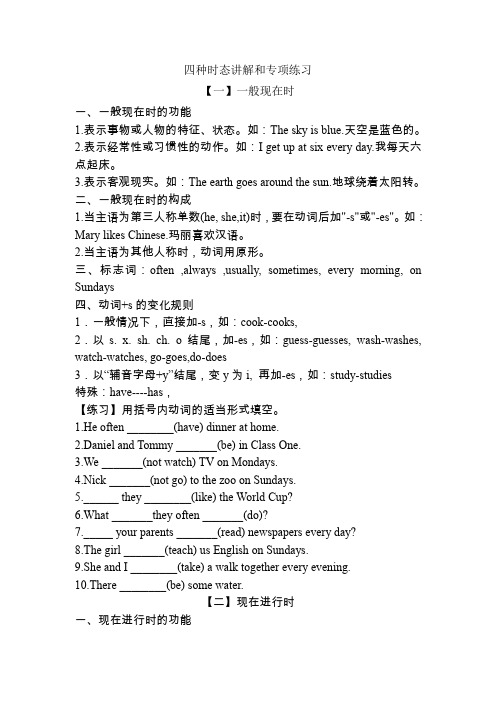
四种时态讲解和专项练习【一】一般现在时一、一般现在时的功能1.表示事物或人物的特征、状态。
如:The sky is blue.天空是蓝色的。
2.表示经常性或习惯性的动作。
如:I get up at six every day.我每天六点起床。
3.表示客观现实。
如:The earth goes around the sun.地球绕着太阳转。
二、一般现在时的构成1.当主语为第三人称单数(he, she,it)时,要在动词后加"-s"或"-es"。
如:Mary likes Chinese.玛丽喜欢汉语。
2.当主语为其他人称时,动词用原形。
三、标志词:often ,always ,usually, sometimes, every morning, on Sundays四、动词+s的变化规则1.一般情况下,直接加-s,如:cook-cooks,2.以s. x. sh. ch. o结尾,加-es,如:guess-guesses, wash-washes, watch-watches, go-goes,do-does3.以“辅音字母+y”结尾,变y为i, 再加-es,如:study-studies特殊:have----has,【练习】用括号内动词的适当形式填空。
1.He often ________(have) dinner at home.2.Daniel and Tommy _______(be) in Class One.3.We _______(not watch) TV on Mondays.4.Nick _______(not go) to the zoo on Sundays.5.______ they ________(like) the World Cup?6.What _______they often _______(do)?7._____ your parents _______(read) newspapers every day?8.The girl _______(teach) us English on Sundays.9.She and I ________(take) a walk together every evening.10.There ________(be) some water.【二】现在进行时一、现在进行时的功能现在进行时表示现在正在进行或发生的动作,也可表示当前一段时间内的活动或现阶段正在进行的动作。
四种时态及其练习(完整版)

四种时态(一般现在时、一般过去时、一般将来时、现在进行时)1.一般现在时。
主要描述经常会发生的动作、状态或不变的真理。
(1)标志词:①always, usually, often, sometimes, hardly, ever, never;②every second / hour /day / year / Friday/ June;③once a week, twice two weeks;(2)结构①组成:主语+be+名词(形容词)I am a student. He is tall.否定句:在be 后加notI am not a student. He is not tall.疑问句:be 动词提前到第一位。
Are you a student Is he tallYes, I am. / No, I am , he is. / No, he isn’t.②主语+动词+地点+时间We go to school on Monday.He goes to the park on Sunday.否定句:主语+don’t/doesn’t+动词原形+地点+时间We don’t go to school on Monday.He doesn’t go to the park on Sunday.疑问句:在句首加do或doesDo you go to school on Monday Yes, we do./ No, we don’t.Does he go to the park on SundayYes, he does./ No, he doesn’t.(3)动词三单变化:①在原单词末尾加s , 如:like – likes②单词以o, sh, ch, s, x 结尾加es, 如:go – goes③单词末尾为辅音+y结尾去y加ies 如:study- studies2. 现在进行时:主要叙述正在发生的事情。
小学英语四大时态总结及练习题

你知道时态是什么意思吗?时态代表什么吗?小学英语就四个时态,你掌握了吗?你能发现它们之间的共同点和不同点吗?勤加练习,百战不殆I.把下列动词变为第三人称单数形式。
1. clean--2. go--3. have--4. do-6. fly--7. come-- brush-9. watch-- 10. study-- 11. ask--13. swim-- 14. catch-- 15. write--16. eat-- 17. make-- 18. paint—19. learn-- 20. phone-- 21. run—22. hop-- 23. sing-- 24. pick—II.把下列动词变成过去式is\am________ fly______ plant_____ are________ drink_________play_______ go________ make ______ do_________dance________ worry_____ask _____ taste_________ eat________draw________ put ______ throw________ kick_________pass_______ do ________III.把下列动词变成动名词形式。
wake________ make__________ come____________ have____________take_________ leave__________ rid_________, regret__________,begin________ cut________, get_________, hit_________, run_________, set_________, sit__________, spit__________, stop_________, swim________, beg_________, drop__________, fit_________, nod_________, dig___________, forget_________, travel_________ visit_________ carry_________ enjoy___________ play ___________ study _____die_________ lie_________多加练习,百战不殆之时态篇一、用单词的正确形式填空:1.Mike _________ (do) his homework every day.2.There __________(be) some water in the glass.3.We like ________ (play) basketball after class.4.I like singing. I often _________(listen) to the music in the evening.5.My grandma_________(watch) TV every day.三、选择最佳的答案:1. ____Alice often play the piano? No, she _____. A. Do; do B. Does; does C. Does; doesn't2. ___ your penpal __ in Beijing? A. Do; live B. Do; lives C. Does; live3. Tom and Mike __ very excited, they will take a trip. A. is B. are C.am4. I like ________ very much. What about you? A. dance B. danced C. dancing5. The kite ____ a bird. A. look like B. is looking C. lookslike6. Bill and I ___ good friends. A. is B. are C. am7. Sandy often ___ his homework on Sundays . A. do B. does C. did8. What do you usually do on the weekend? I __________.A. went swimmingB. go swimmingC. visited grandparents9. What do you usually do on your holiday? I usually __________.A. saw elephantsB. sing and dance picture10. I ____ a student. I go to school ____bus every day. A. is; by B. am; onC. am; by11. I ____ a brother. She ____ a sister. A. have; has B. has; hasC. have; have12. You ____ a student. He ____ a teacher. A. is; is B. are; is C. are;are13. He always _____ football games. A. watches B. watch C. doesn't14. My best friend _____ shells. A. collects B. collect C. often15. She doesn’t _____ listening to the music. A. often B. like C. likes16. My mother and I ___ always watch romantic films. A. doesn’t B. don’tC. do17. ---When _____ he get home on Friday?----He gets home at four on Friday. A. do B. does C. did18.Summer _________ spring.A. comes afterB. comes in before二、用单词的适当形式填空:1. look! Chen Jie and Mike are ___________(sing)now.2. The small bear is _____________ (climb) the tree.3. Mike is ________________ (draw) picture.4. She is ________________ (do) the dishes.5. My brother __________ (make) kites now.6. My father is ___________ (read) a newspaper in living room.7. Ted is __________(answer) the phone.8. My uncle is ____________ (drive) a car.9. The students are ______________(listen) to their teacher carefully.10. Chen Jie is _________(wash) clothes.11. His sister _______ (be) writing an e-mail.12. We ______(be) cleaning the classroom now.13. I____ (be)working on my computer.14. They _____ (be)playing basketball.15. Look, The tiger ________ __________(walk).16. Look, The elephants ______ _____________(drink) water with their trunk.17. Look, The monkeys ________ ___________ (swing).18. Peter _________ ______________(take) pictures now.19. They _____ ________(take)up the apples now.20. We _______ ________(catch) butterflies now.三、选择正确答案1. Every one ____ to their teacher in the classroom. A. are listening B. is listening C. listen2. They are singing and ___ together at the party now. A. dance B. dancedC. dancing3. Listen! The birds ____. A. is singing B. are sing C.are singing4. Look! The kite ___ in the sky. A. fly B. flies C. is flying5. They ____ riding a forse. A. is B. are C. am6. Kate ____ playing chess. A. am B. is C. are7. Are you washing clothes? A. Yes, you are B. Yes, I amC. No, I am8. Is he ____ TV?Yes, he is. A. watch B. watching C. not9. ____ they taking pictures.? Yes, they are. A. Am B. Be C. Are10. It’s 10 o’clock. Ben _____ TV in the bedroom. A. watch B. is watchingC. watches五、根据中文填空。
- 1、下载文档前请自行甄别文档内容的完整性,平台不提供额外的编辑、内容补充、找答案等附加服务。
- 2、"仅部分预览"的文档,不可在线预览部分如存在完整性等问题,可反馈申请退款(可完整预览的文档不适用该条件!)。
- 3、如文档侵犯您的权益,请联系客服反馈,我们会尽快为您处理(人工客服工作时间:9:00-18:30)。
一般現在時1.写出下列动词的三单形式go_____catch______brush(刷)_____wash______do______like_____have_____watch________ drink____fly_____say_____learn______eat______read_____sing_____buy______study_______ stay ____make _____ look ____ pass_____carry ____ come_____plant_____teach_____buy___2.用括号内动词的适当形式填空。
1. We often___________(play) in the playground.2. He _________(get) up at six o’clock.3.__________you_________(brush) your teeth every morning.4. What________ (do) he usually______ (do) after school?5.Danny_______(study)English,Chinese,Maths,Science and Art at school.6. Mike sometimes __________(go) to the park with his sister.7. At eight at night, she often__________(watch) TV with his parents.8. ________ Mike________(read) English every day?9.How many lessons_________your classmate________(have) on Monday?10. What time_________his mother_________(do) the housework?3.选择题( )1. I ________to school at 7:00 in the morning.A. goB. goingC. goes( )2. They _______books every day in the library.A.readsB. readC. reading( )3. The monkey________ eating bananas very much.A.likeB. likesC. liking( )4. My father ________to read newspaper after supper every day.A.likeB. likesC. liking( )5. I like watching TV, but my mother _________like it.A. don’tB. doesn’tC. does( )6. ____________ your father drink milk every day?A.doB. areC. does()7. We will go shopping if it____ tomorrow.A. don't rainB. didn't rainC.doesn't rainD. isn't rain()8. He said the sun ____in the east and ____in the west.A rose; setB rises; setsC rises, setD rise; sets()9.Wang Mei ____ music and often ____ to music.A like; listenB likes; listensC like; are listeningD liking ; listen()10. Jenny____ English every evening.A has studyB studiesC studyD studied4.改错(划出错误的地方,将正确的写在横线上)1. Is your brother speak English? __________________2. Does he likes going fishing? __________________3. He likes play games after class. __________________4. Mr. Wu teachs us English. __________________5. She don't do her homework on Sundays. _________________5.把下列句子变成一般疑问句(并作肯定和否定回答)、否定句例:I like cooking.→Do you like cooking? Yes, I do. No, I don't.I don't like cooking.1.My friends like playing soccer.2.They speak English every day.3.Daniel watches TV every evening4.John is from Canada.5.Tom does his homework at home.6.My dog runs fast.7. Amy likes playing computer games.8. She can play the piano well.一般過去時1. 单项选择:从下列各题后所给的四个选项中选择最佳答案填空。
(10)( )1.My father______ill yesterday.A.isn't B.aren't C.wasn't D.weren't( )2.______your parents at home last week﹖A.Is B.Was C.Are D.Were( )3.The twins______in Dalian last year.They______here now.A.are; were B.were; are C.was; are D.were; was ( )4.______your father at work the day_____yesterday(前天)﹖A.Was; before B.Is; before C.Was; after D.Is; after( )5.—Who was on duty last Friday﹖—______.A.I am B.I was C.Yes, I was D.No, I wasn't ( )6. I cleaned my classroom ___________.A with three hoursB three hours agoC in three hoursD three hours before( ) 7. I came _______ my house two days ago .A back onB back toC to backD back( ) 8 . ___________? He did some reading at home.A What does your father do yesterday eveningB What does your brother do in the schoolC What did your brother do over the weekendD Where did your brother go last Sunday( ) 9. What did you do ________ ? I went to the movies.A next morning Bover the weekend C in the weekend D next Monday( ) 10. The koala sleeps _______,but gets up _________.A during the day; at the eveningB at day ;during nightC in the day ;during the eveningD during the day ; at night二、请用正确动词形式填空。
(10)1. I _________ (have) an exciting party last weekend.2. _________ she _________(practice) her guitar yesterday? No, she _________.3. What ________ Tom ________ (do) on Saturday evening?He ________(watch) TV and __________(read) an interesting book.4. They all _________(go) to the mountains yesterday morning.5. She _________(not visit) her aunt last weekend.She ________ (stay) at home and _________(do) some cleaning.6. When ________ you _________(write) this song? I __________(write) it last year.7. My friend, Carol, ________(study) for the math test and ________(practice) English last night.8. ________ Mr. Li __________(do) the project on Monday morning? Yes, he _________.9. How _________(be) Jim's weekend? It _________(be not) bad.10. ________ (be) your mother a sales assistant last year? No. she __________.三、翻译下列句子(20)1. 我过了一个忙碌但却刺激的周末。
